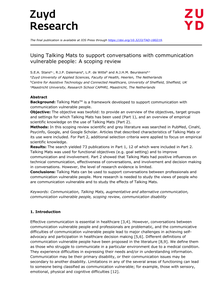This dissertation describes a research project about the communication between communication vulnerable people and health care professionals in long-term care settings. Communication vulnerable people experience functional communication difficulties in particular situations, due to medical conditions. They experience difficulties expressing themselves or understanding professionals, and/or professionals experience difficulties understanding these clients. Dialogue conversations between clients and professionals in healthcare, which for example concern health-related goals, activity and participation choices, diagnostics, treatment options, and treatment evaluation, are, however, crucial for successful client-centred care and shared decision making. Dialogue conversations facilitate essential exchanges between clients and healthcare professionals, and both clients and professionals should play a significant role in the conversation. It is unknown how communication vulnerable people and their healthcare professionals experience dialogue conversations and what can be done to support successful communication in these conversations. The aim of this research is to explore how communication vulnerable clients and professionals experience their communication in dialogue conversations in long-term care and how they can best be supported in improving their communication in these conversations.
DOCUMENT

Background: Talking Mats is a framework developed to support communication with communication vulnerable people. Objective: The objective was twofold: to provide an overview of the objectives, target groups and settings for which Talking Mats has been used (Part 1), and an overview of empirical scientific knowledge on the use of Talking Mats (Part 2). Methods: In this scoping review scientific and grey literature was searched in PubMed, Cinahl, Psycinfo, Google, and Google Scholar. Articles that described characteristics of Talking Mats or its use were included. For Part 2, additional selection criteria were applied to focus on empirical scientific knowledge. Results: The search yielded 73 publications in Part 1, 12 of which were included in Part 2. Talking Mats was used for functional objectives (e.g. goal setting) and to improve communication and involvement. Part 2 showed that Talking Mats had positive influences on technical communication, effectiveness of conversations, and involvement and decision making in conversations. However, the level of research evidence is limited. Conclusions: Talking Mats can be used to support conversations between professionals and communication vulnerable people. More research is needed to study the views of people who are communication vulnerable and to study the effects of Talking Mats.
DOCUMENT

Objective: To gain insight into how communication vulnerable people and health-care professionals experience the communication in dialogue conversations, and how they adjust their conversation using augmentative and alternative communication (AAC) or other communication strategies. Methods: Communication vulnerable clients and health-care professionals in a long-term care institution were observed during a dialogue conversation (n = 11) and subsequently interviewed (n = 22) about their experiences with the conversation. The clients had various communication difficulties due to different underlying aetiologies, such as acquired brain injury or learning disorder. Results from the observations and interviews were analysed using conventional content analysis. Results: Seven key themes emerged regarding the experiences of clients and professionals: clients blame themselves for miscommunications; the relevance of both parties preparing the conversation; a quiet and familiar environment benefitting communication; giving clients enough time; the importance and complexity of nonverbal communication; the need to tailor communication to the client; prejudices and inexperience regarding AAC. The observations showed that some professionals had difficulties using appropriate communication strategies and all professionals relied mostly on verbal or nonverbal communication strategies. Conclusion: Professionals were aware of the importance of preparation, sufficient time, a suitable environment and considering nonverbal communication in dialogue conversations. However, they struggled with adequate use of communication strategies, such as verbal communication and AAC. There is a lack of knowledge about AAC, and professionals and clients need to be informed about the potential of AAC and how this can help them achieve equal participation in dialogue conversations in addition to other communication strategies.
DOCUMENT
